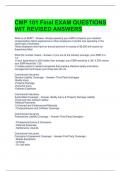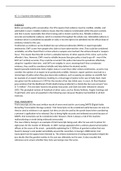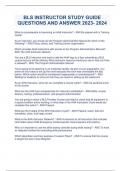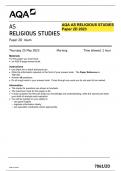WIT REVISED ANSWERS
What is an EMR? - Answer--Simply speaking your EMR compares your workers'
compensation claims experience to other employers of similar size operating in the
same type of business.
-Most employers who have an annual premium in excess of $3,000 will receive an
Experience Mod.
What the number means - Answer--If you are at the industry average, your EMR is a
1.0.
-If your experience is 20% better than average, your EMR would be a .80. If 20% worse
your EMR would be 1.20.
-It makes sense to reward companies that practice effective safety and claims
management techniques over those who do not.
Commercial Insurance
General Liability Coverage: - Answer--Third Party Damages
-Bodily Injury
-Property Damage
-Personal Injury
-Defense Expenses
Commercial Insurance
Automobile Coverage: - Answer--Bodily Injury & Property Damage Liability
-Hired and Non-Owned Liability
-Medical Payments
-Uninsured and Underinsured Motorists
-*Comprehensive and Collision Coverage
Commercial Insurance
Professional Liability Coverage: - Answer-Third Party Damages -
-Professional Errors & Omissions
-Defense Expenses
-Settlements, Awards
Commercial Insurance
Contractor's Equipment Coverage: - Answer-First Party Coverage -
-Mobile Equipment
-At Shop
-On Job-sites
,-In Transit
-Hired, Borrowed and Rented
-Crane Overload
Commercial Insurance
Builder's Risk Coverage: - Answer--Property insurance that covers the owner and
builder during the
course of construction.
-Residential and Commercial construction from start to finish.
-Builders risk insurance is a form of property insurance that covers property owners and
builders for projects under construction.
-It is "all risk coverage," meaning that it protects the insured from events such as
vandalism, accidental losses and damages to the property.
-Other types of losses, such as flood, earthquake, or terrorism, may be added to the
policy, if desired or needed.
-Because of the enormous risk of some jobs, many lenders require that this coverage
be purchased before they will approve a loan for the project.
-The building owner is usually responsible for buying builder's risk insurance. The
contractor on the project may be added to the policy as a named insured or additional
insured.
-Under this type of policy, the building or structure itself is insured against loss. Any
materials or supplies on the job site will also be covered while the policy is in force.
-Contractor tools and equipment are not covered - additional insurance will be required.
Underwriter - Answer-Defined: one who evaluates a business decision with regard to:
1.Risk
2.Profitability
Underwriting: - Answer--Experience (claim history) plays a significant role in premium
level
-Underwriters are concerned with loss frequency issues
-Just as your workers compensation premium is adjusted via an experience rating
factor, rates on other lines of insurance are debited or credited according to the claim
history
Underwriters look for these
account characteristics - - Answer--Solid financial position
-Quality management
Management's control of risk:
-Auto
-Safety
-Etc.
Construction Contracts - Answer-Specifies the legal responsibilities and obligations
between the project Owner and the Contractors.
,Construction Contracts
Issues: - Answer--Indemnification Agreements (Huge)
-Insurance Specifications
-Insurance Compliance/Certificates of Insurance
-Additional Insureds and Waivers
-Builder's Risk (Who is responsible)
-Safety and Loss Control Programs (Discretion of Owner)
-OSHA Compliance
Construction Contracts
Indemnification Agreements: - Answer-Broad Form - AVOID -
Pay any and all damages, costs, and expenses - even for sole negligence of owner.
Your insurance carrier would pay for claims caused by others.
Limited Form - ACCEPT -
Pay bodily injury and property damages to the extent of insured's own negligence.
Construction contingency: - Answer--The construction contingency is a set percentage
of the construction contract amount budgeted for unforeseen emergencies or design
shortfalls identified after a construction project commences.
-Construction contingencies are often, but not always, limited to 5 percent of the
construction estimate/bid for a new facility and 7 percent of the construction
estimate/bid for remodeling/renovation projects.
Construction Trades - Answer--Carpenters
-Masons
-Electricians
-Pipefitters
-Tile setters
-Carpet layers
-Painters
-HVAC
-Sheet Metal
-Roofers
-Dry Wallers
-Landscapers
-Concrete finishers
-Concrete placers
-Iron Workers
-Fire Suppression Workers
-Glazers
-Etc., etc., etc.
Labor Structure - Answer--union
-non-union (merit shop)
, Labor Unions - Answer--The rise of labor organizations resulted
from the growth of industry in the 1920's and the devastating effects of
the Great Depression in the 1930s.
-During the Great Depression, unemployment was high.
-Many employers tried to get as much work as possible from their employees for the
lowest possible wage.
-Workers were upset with the speedup of assembly lines, poor working conditions and
the lack of job security.
-Seeking strength in unity, they formed unions.
-Automobile workers organized the U.A.W. (United Automobile Workers of America) in
1935. General Motors would not recognize the U.A.W. as the workers' bargaining
representative. Hearing rumors that G.M. was moving work to factories where the union
was not as strong, workers in Flint, Michigan at General Motors' Fisher Body plant #1,
began a sit-down strike on December 30, 1936.
Chaos
or
A Well Orchestrated Effort? - Answer--Delivery trucks
-Fork lifts
-Workers running around
-Banging
-Dirt & dust flying
Superintendent
(The Conductor) - Answer-A construction superintendent is the owner's or contractor's
representative on site. They are responsible for:
-coordination of workers and vendors
-continuous field supervision, and
-completion of the work.
The construction superintendent
"runs" the job site.
Superintendent's Tasks
(Generic) - Answer-Some job related tasks:
-Is responsible for controlling costs.
-Organizes and coordinates subcontractors.
-Has control over the schedule - start / finish dates.
-Keeps cost records on work performed and materials used.
-Assures conformity with the plans and specifications through regular inspections.
-Supervises the clerical staff, and other personnel employed on the site and handles
safety training.
-Must have a great deal of construction experience.





